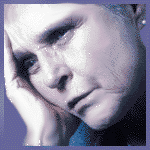Depression Screening Advised for All Adults
The US Preventive Services Task Force (USPSTF) recommends screening for depression in adults. What does this mean for you? The next time you have a doctor’s appointment, you may be asked questions about your mental health.
Scope of the Problem
We have known for years that depression is a big problem. According to the National Institutes of Mental Health, major depressive disorder is the leading cause of disability in theUS. In a given year, millions of Americans will be diagnosed with a mood disorder (major depressive, dysthymic, or bipolar disorder).
A number of people with the disorder do not even know they have it. Depression is often disguised by other problems. And, though the stigma tied to the disorder is easing, many who are affected still go undetected and untreated.
Screening Advice
 The USPSTF urges primary care doctors to screen all adult patients for signs of depression and give them appropriate treatment and follow up care.
The USPSTF urges primary care doctors to screen all adult patients for signs of depression and give them appropriate treatment and follow up care.
Depression Questions
According to USPSTF, the following two questions are a good place to start:
- Over the past two weeks, have you ever felt down, depressed, or hopeless?
- Over the past two weeks, have you felt little interest or pleasure in doing things?
If your answer is “yes” to either question, contact your primary care doctor for an evaluation. Your doctor may advise completing a more in-depth questionnaire or having a thorough check-up.
Risks for Depression
Research suggests depression comes from an imbalance of certain brain hormones. The disorder is more common in people who inherit a tendency for depression or are exposed to certain environmental triggers. Factors that can increase your chance of developing depression include:
- Personal history of depression
- Having another mental disorder
- Family history of depression or spousal history of depression
- Loss of a job
- Recent loss of a loved one or miscarriage (for women)
- Chronic medical illness, such as diabetes
- Problems with sleep
- Chronic pain
- Current or past alcohol or drug abuse
- Child abuse or neglect
- Domestic violence or bullying
- Financial stress
Diagnosis
If you suspect you suffer from depression, your doctor can make a diagnosis after a complete exam. The diagnosis requires having at least five symptoms for more than two weeks that are severe enough to interfere with your daily routine. The symptoms of depression include the following:
- Persistent sad, anxious, or empty feelings*
- Loss of interest or pleasure in activities that were once enjoyable*
- Reduced appetite and weight loss, or increased appetite and weight gain
- Sleeping too little or sleeping too much
- Feelings of restlessness or irritability, or feeling slowed down
- Persistent feelings of decreased energy, tiredness, or listlessness
- Frequently feeling guilty, hopeless, helpless, or worthless
- Difficulty thinking, concentrating, remembering, or making decisions
- Thoughts of death or suicide
*Either the first or second symptom on this list must be present for a diagnosis of depression.
Your doctor will also make sure that your symptoms are not being caused by other psychiatric or medical conditions.
Effective Treatment
Depression is very treatable. Research has shown that antidepressant drugs and counseling—alone or in combination—are effective in combating the disorder. However, the combination of “talk-therapy” and “drug therapy” may be more effective than either alone. Alternative treatments, such asSt. John’swort, are also being studied. And adjusting your lifestyle to include more exercise and social activities may help, as well.
You are encouraged to talk to your doctor if you have concerns about your mental health. If you have thoughts of death or suicide, call your doctor right away. With better screening and medical care, the future looks brighter for adults with depression.
REFERENCES:
Screening for depression in adult. U.S. Preventive Services Task Force website.
USPreventive Services Task Force now finds sufficient evidence to recommend screening adults for depression [press release]. Agency for Healthcare Research and Quality.
US Preventive Services Task Force. Screening for depression in adults: Summary of the evidence. Ann Int Med. 2002;136:765-776.
US Preventive Services Task Force. Screening for depression: Recommendations and rationale. Ann Int Med . 2002;136:760-764.





